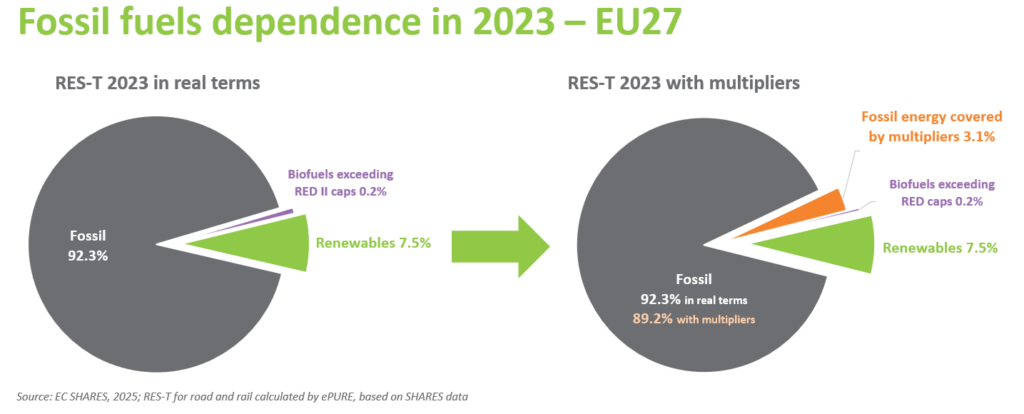Misleading ‘multipliers’ continue to exaggerate growth in renewable energy sources across the EU, according to new analysis, with road transport still overly dependent on fossil fuel
The EU’s continued discrimination against the use of sustainable crop-based biofuels to reduce emissions from transport has left Europe needlessly reliant on fossil fuels, with many Member States still falling short of renewable energy targets, a new analysis shows.
According to updated figures from 2023 in Eurostat’s SHARES database, the EU is still overwhelmingly dependent on fossil fuel for transport, with just 10.8% of energy coming from renewable sources. However, a significant amount of the reported renewable energy consumption is artificially inflated using multipliers for certain biofuels or renewable electricity. The result is a misleading picture of progress towards climate goals.
Without those multipliers, the share of renewable energy in EU transport in 2023 was in fact just 7.5%. Fossil fuels still accounted for 92.3% of transport energy, when considered in real terms, as opposed to 89.2% with multipliers. Meanwhile the use of crop-based biofuels in transport by Member States is capped under the Renewable Energy Directive, at a level equal to each country’s share of crop-based biofuels in the final energy consumption in road and rail in 2020 + 1%, but capped to a maximum of 7%.
Without considering multipliers and biofuels caps, in 2023, only three Member States (Sweden, Finland and Austria) are above 10% RES-T, which was the target that should have been fulfilled in 2020 under RED I. While Finland and Sweden have already largely incorporated renewables in their transport energy mix, already surpassing the 14% RED II target for 2030, most other Member States have made little progress in this regard compared to previous years.
The EU’s lack of progress on renewables in transport is worrying, because the RES-T target set by RED III is more than double that of RED-II, requiring MS to achieve 29% RES-T by 2030. Consequently, the share of renewables in transport including multipliers reported in 2023 must be tripled in just five years in order to meet the 2030 target.
“The much-needed growth in renewable energy sources in transport has been held back by EU policies that unfairly hamstring Member States from using sustainable crop-based biofuels to replace fossil fuels,” said David Carpintero, Director General of ePURE, the European renewable ethanol association. “Instead of artificially inflating renewable energy growth with make-believe multipliers, the EU should favour renewables that actually make a difference in the fight against climate change: this includes European renewable ethanol.”
In fact, in 2023, nine EU Member States (Belgium, Bulgaria, Cyprus, Denmark, Estonia, Lithuania, Poland, Slovakia, Sweden) reported higher shares of renewable energy in transport compared to 2022 with multipliers despite having equal or lower RES-T in real terms.

SOURCE: ePURE

